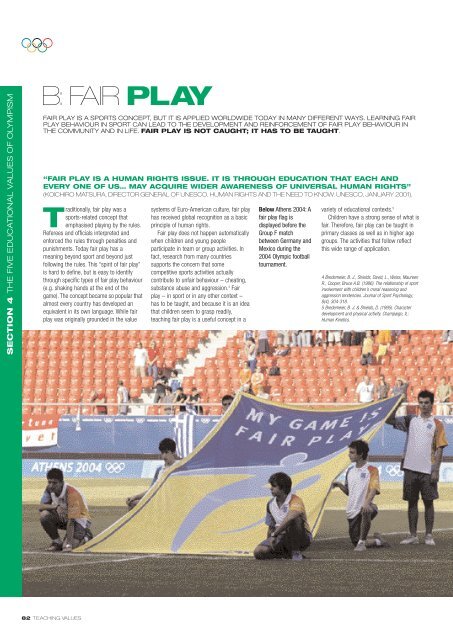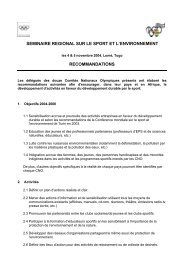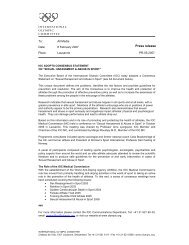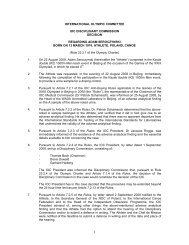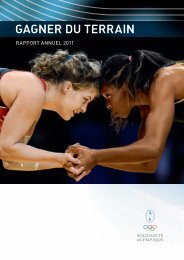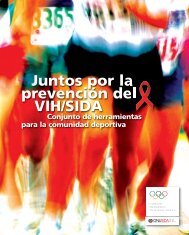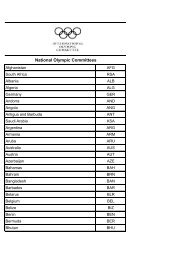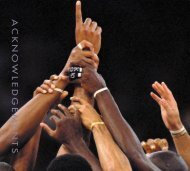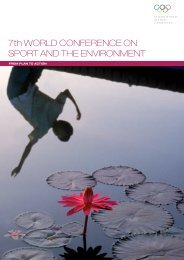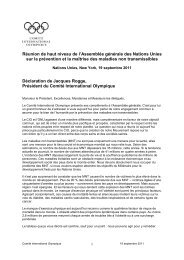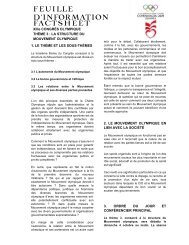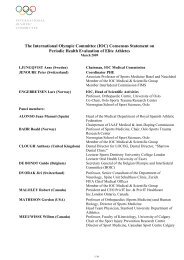Teaching Values- An Olympic Education Toolkit - International ...
Teaching Values- An Olympic Education Toolkit - International ...
Teaching Values- An Olympic Education Toolkit - International ...
You also want an ePaper? Increase the reach of your titles
YUMPU automatically turns print PDFs into web optimized ePapers that Google loves.
SECTION 4 THE FIVE EDUCATIONAL VALUES OF OLYMPISM<br />
B: FAIR PLAY<br />
FAIR PLAY IS A SPORTS CONCEPT, BUT IT IS APPLIED WORLDWIDE TODAY IN MANY DIFFERENT WAYS. LEARNING FAIR<br />
PLAY BEHAVIOUR IN SPORT CAN LEAD TO THE DEVELOPMENT AND REINFORCEMENT OF FAIR PLAY BEHAVIOUR IN<br />
THE COMMUNITY AND IN LIFE. FAIR PLAY IS NOT CAUGHT; IT HAS TO BE TAUGHT.<br />
“FAIR PLAY IS A HUMAN RIGHTS ISSUE. IT IS THROUGH EDUCATION THAT EACH AND<br />
EVERY ONE OF US… MAY ACQUIRE WIDER AWARENESS OF UNIVERSAL HUMAN RIGHTS”<br />
(KOICHIRO MATSURA, DIRECTOR GENERAL OF UNESCO. HUMAN RIGHTS AND THE NEED TO KNOW. UNESCO, JANUARY 2001).<br />
Traditionally, fair play was a<br />
sports-related concept that<br />
emphasised playing by the rules.<br />
Referees and officials interpreted and<br />
enforced the rules through penalties and<br />
punishments. Today fair play has a<br />
meaning beyond sport and beyond just<br />
following the rules. This “spirit of fair play”<br />
is hard to define, but is easy to identify<br />
through specific types of fair play behaviour<br />
(e.g. shaking hands at the end of the<br />
game). The concept became so popular that<br />
almost every country has developed an<br />
equivalent in its own language. While fair<br />
play was originally grounded in the value<br />
systems of Euro-American culture, fair play<br />
has received global recognition as a basic<br />
principle of human rights.<br />
Fair play does not happen automatically<br />
when children and young people<br />
participate in team or group activities. In<br />
fact, research from many countries<br />
supports the concern that some<br />
competitive sports activities actually<br />
contribute to unfair behaviour – cheating,<br />
substance abuse and aggression. 4 Fair<br />
play – in sport or in any other context –<br />
has to be taught, and because it is an idea<br />
that children seem to grasp readily,<br />
teaching fair play is a useful concept in a<br />
Below Athens 2004: A<br />
fair play flag is<br />
displayed before the<br />
Group F match<br />
between Germany and<br />
Mexico during the<br />
2004 <strong>Olympic</strong> football<br />
tournament.<br />
variety of educational contexts. 5<br />
Children have a strong sense of what is<br />
fair. Therefore, fair play can be taught in<br />
primary classes as well as in higher age<br />
groups. The activities that follow reflect<br />
this wide range of application.<br />
4 Bredemeier, B. J., Shields, David, L., Weiss, Maureen<br />
R., Cooper, Bruce A.B. (1986). The relationship of sport<br />
involvement with children’s moral reasoning and<br />
aggression tendencies. Journal of Sport Psychology,<br />
8(4), 304-318.<br />
5 Bredemeier, B. J. & Shields, D. (1995). Character<br />
development and physical activity. Champaign, IL:<br />
Human Kinetics.<br />
82 TEACHING VALUES


